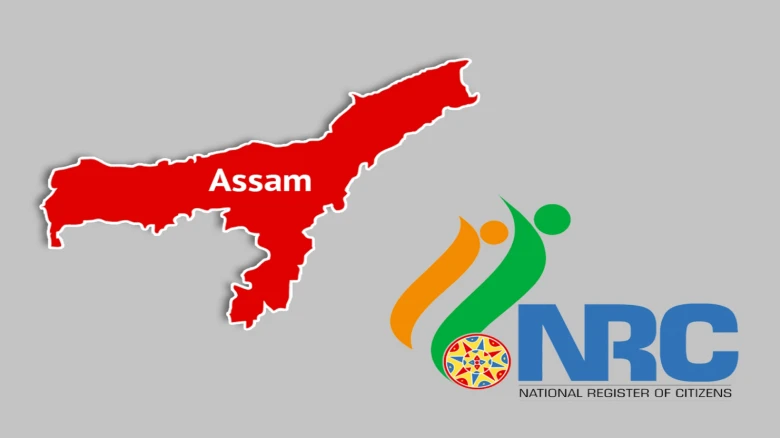The NRC update process began in December 2014 with an initial project cost of Rs 288.18 crore, according to the CAG report, which was presented to the Assam Legislative Assembly on Saturday.
Digital Desk: The National Register of Citizens (NRC) update process was plagued by "various irregularities in the utilisation of funds, including excess and inadmissible payment to vendors," the recent report from the Comptroller and Auditor General of India (CAG) stated. The report recommended placing blame on both the State Coordinator of NRC (SCNRC) and the System Integrator, Wipro Limited.
The NRC update process began in December 2014 with an initial project cost of Rs 288.18 crore, according to the CAG report, which was presented to the Assam Legislative Assembly on Saturday. However, due to time overruns, the cost finally increased to Rs 1,579 crore by March 2022.
According to the study, "A highly secure and dependable software was necessary to be produced during the NRC update process; audit, however, noticed lack of sufficient planning in this regard to the point that 215 software utilities were haphazardly added to the core software. Both software development and the selection of a vendor through an eligibility assessment after a nationwide tendering were done without following the proper procedures. Software and utilities for NRC data gathering and correction were developed haphazardly, which increased the danger of data tampering without leaving an audit trail. The audit trail might have assured of responsibility for the accuracy of NRC data.
Therefore, despite a direct investment of Rs. 1,579 crores and labour cost of deployment of a significant number of government employees ranging from 40,000 to 71,000, the declared purpose of compiling a legitimate, error-free NRC has not yet been realised.
Therefore, the CAG report advises that "responsibility of the SCNRC should be fixed and action taken in a time-bound manner for excess, irregular and inadmissible payment made to the vendor". The second recommendation given by the CAG report is that "penal action has to be initiated against the System Integrator (M/s Wipro Limited) for breach of the Minimum Wages Act since payments were provided to operators at a rate less than the minimum wages."
The third recommendation made in the report is that "accountability of SCNRC, as Principal Employer, should also be established for not assuring compliance with the Minimum Wages Act." The report goes on to say that the state government's reaction in this respect made it clear that the Supreme Court was in charge of overseeing and directing the entire NRC update process, and that the state government was merely providing logistical support. The state government's answer went on to say that the SCNRC was entirely accountable for the anomalies mentioned in the CAG report because it was performing the updating work under the direction and supervision of the Supreme Court.
"However, as the NRC process was executed out of public funds, the state government/SCNRC werDigital Desk: The National Register of Citizens (NRC) update process was plagued by "various irregularities in the utilisation of funds, including excess and inadmissible payment to vendors," the recent report from the Comptroller and Auditor General of India (CAG) stated. The report recommended placing blame on both the State Coordinator of NRC (SCNRC) and the System Integrator, Wipro Limited.
The NRC update process began in December 2014 with an initial project cost of Rs 288.18 crore, according to the CAG report, which was presented to the Assam Legislative Assembly on Saturday. However, due to time overruns, the cost finally increased to Rs 1,579 crore by March 2022.
According to the study, "A highly secure and dependable software was necessary to be produced during the NRC update process; audit, however, noticed lack of sufficient planning in this regard to the point that 215 software utilities were haphazardly added to the core software. Both software development and the selection of a vendor through an eligibility assessment after a nationwide tendering were done without following the proper procedures. Software and utilities for NRC data gathering and correction were developed haphazardly, which increased the danger of data tampering without leaving an audit trail. The audit trail might have assured of responsibility for the accuracy of NRC data.
Therefore, despite a direct investment of Rs. 1,579 crores and labour cost of deployment of a significant number of government employees ranging from 40,000 to 71,000, the declared purpose of compiling a legitimate, error-free NRC has not yet been realised.
Therefore, the CAG report advises that "responsibility of the SCNRC should be fixed and action taken in a time-bound manner for excess, irregular and inadmissible payment made to the vendor". The second recommendation given by the CAG report is that "penal action has to be initiated against the System Integrator (M/s Wipro Limited) for breach of the Minimum Wages Act since payments were provided to operators at a rate less than the minimum wages."
The third recommendation made in the report is that "accountability of SCNRC, as Principal Employer, should also be established for not assuring compliance with the Minimum Wages Act." The report goes on to say that the state government's reaction in this respect made it clear that the Supreme Court was in charge of overseeing and directing the entire NRC update process, and that the state government was merely providing logistical support. The state government's answer went on to say that the SCNRC was entirely accountable for the anomalies mentioned in the CAG report because it was performing the updating work under the direction and supervision of the Supreme Court.
"However, as the NRC process was executed out of public funds, the state government/SCNRC were obliged to assure compliance with financial laws and regulations on both regularity and propriety for all expenditures incurred," the study states.
e obliged to assure compliance with financial laws and regulations on both regularity and propriety for all expenditures incurred," the study states.

Leave A Comment